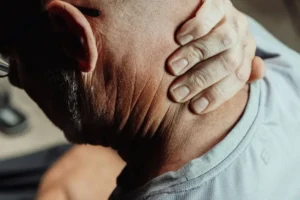HGH for Injury Recovery: How It Speeds Up Healing and Restores Strength
- Updated on: Nov 26, 2024
- 4 min Read
- Published on Nov 26, 2024

Injury recovery can be challenging, whether it’s a sports injury, surgery, or an accident. Many people are looking for ways to heal faster and get back to their normal lives. One option that has gained attention is Human Growth Hormone (HGH). This naturally occurring hormone plays an important role in our body’s ability to grow and repair itself. But how exactly does it help with injury recovery? Let’s explore what HGH is, how it works, and whether it’s a good option for speeding up healing.
What Is Human Growth Hormone (HGH)?
Human Growth Hormone, or HGH, is a hormone made by the pituitary gland, a small pea-shaped gland at the base of your brain. HGH is essential for growth during childhood and for maintaining healthy tissues and organs in adults.
HGH helps the body:
- Grow bones and muscles.
- Repair damaged tissues.
- Regulate metabolism, which is how your body turns food into energy.
Your body naturally produces HGH, especially during sleep and exercise. However, as you age, HGH levels decrease. This is why older adults tend to heal more slowly than younger people.
How Does HGH Help with Injury Recovery?
HGH is known for its ability to stimulate cell growth and repair tissues, which are key for healing injuries. Here’s how it works:
- Promotes Cell Regeneration HGH speeds up the production of new cells, including skin, muscle, and bone cells. This helps wounds heal faster and strengthens the injured area.
- Boosts Protein Production Protein is essential for repairing muscles and tissues. HGH helps your body make more protein, which aids in healing.
- Increases Bone Healing For broken bones or fractures, HGH stimulates the growth of bone cells, speeding up the recovery process.
- Improves Blood Flow HGH enhances blood circulation to injured areas, bringing oxygen and nutrients needed for faster recovery.
Is HGH Safe for Everyone?
While HGH can help with recovery, it’s not without risks. Taking extra HGH when your body doesn’t need it can lead to side effects, including:
- Swelling and Joint Pain: Excess HGH can cause fluid buildup, leading to discomfort.
- High Blood Sugar Levels: HGH may interfere with insulin, the hormone that controls blood sugar.
- Growth of Abnormal Cells: There is concern that HGH might promote the growth of tumors or cancer cells.
It’s important to remember that HGH is not a quick solution. Using it without medical supervision can be dangerous. Always consult a doctor before considering HGH therapy.
Is HGH Legal?
The legality of HGH depends on where you live and why you want to use it.
- Medical Use: In many countries, including the United States, HGH is approved for medical conditions like growth hormone deficiency or muscle-wasting diseases. It is only available by prescription.
- Athletic Use: Using HGH to improve sports performance is banned in most sports organizations, including the Olympics and professional leagues.
- Buying HGH: In some places, buying HGH without a prescription is illegal. Be cautious about buying it online, as many products are fake or unsafe.
Always check your country’s regulations before considering HGH.
Alternatives to HGH for Recovery
If HGH isn’t for you, don’t worry. There are other effective ways to speed up recovery without the risks associated with hormone therapy.
- Physical Therapy Physical therapy is a safe and proven method for recovering from injuries. Therapists use exercises and techniques to strengthen muscles, improve flexibility, and reduce pain.
- Good Nutrition Eating a balanced diet with plenty of protein, vitamins, and minerals can help your body heal naturally. Foods like lean meats, fish, eggs, fruits, and vegetables are great for recovery.
- Rest and Sleep: Your body heals itself while you rest. Make sure you get enough sleep and avoid overusing the injured area.
- Natural HGH Boosters Some people prefer to boost their natural HGH levels instead of taking supplements. Exercise, especially high-intensity workouts, and getting quality sleep can increase your HGH production.
What Do Experts Say About HGH?
Doctors and scientists have mixed opinions about HGH for injury recovery. While some see it as a helpful tool for speeding up healing, others caution against its use due to side effects and ethical concerns.
- Proponents argue that HGH can be life-changing for patients with severe injuries or slow healing. It’s especially helpful for older adults or people with low natural HGH levels.
- Skeptics point out that for most people, the risks outweigh the benefits. They recommend sticking to traditional recovery methods unless HGH is medically necessary.
Ultimately, the decision to use HGH should be made with your doctor based on your specific needs and health condition.
Should You Consider HGH for Recovery?
HGH can be a powerful tool for speeding up recovery, but it’s not for everyone. Before considering HGH, ask yourself:
- Do I have a medical need for HGH, or are there safer alternatives?
- Have I talked to a doctor about the potential risks and benefits?
- Is it legal to use HGH in my situation?
If you’re unsure, it’s best to stick with proven methods like physical therapy, good nutrition, and rest.
Conclusion
HGH has the potential to speed up healing and restore strength after an injury. It works by promoting cell growth, improving protein production, and enhancing blood flow to injured areas. However, it’s not without risks, and it’s not suitable for everyone. If you’re considering HGH, talk to a healthcare professional to determine if it’s the right choice for you. In many cases, traditional recovery methods like physical therapy, proper nutrition, and rest can be just as effective and much safer.












